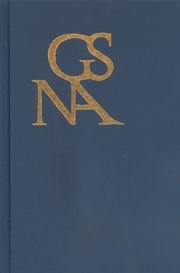Book contents
- Frontmatter
- Contents
- Illustrations
- Special section on childhood edited by Anthony Krupp
- Natural Palingenesis: Childhood, Memory, and Self-Experience in Herder and Jean Paul
- The Promises of Childhood: Autobiography in Goethe and Jean Paul
- The Education of Humankind: Perfectibility and Discipline in Kant's Lectures Über Pädagogik
- Kästchenwahl
- Sentimental Confusion: Art, Nature, and Aesthetic Autonomy in Goethe's Der Triumph der Empfindsamkeit
- Seeing the Light: Goethe's Märchen as Science—Newton's Science as Fairy Tale
- The Ironic “Tick” in Goethe's Egmont:The Potentials and Limits of the Modern Heroic and Poetic Ideal
- The Philosophical Concept of the Daemonic in Goethe's “Mächtiges Überraschen”
- “Die pilgernde Törin”: Genesis, Revaluation, and Mirroring in Goethe's Wanderjahre
- Book Reviews
The Ironic “Tick” in Goethe's Egmont:The Potentials and Limits of the Modern Heroic and Poetic Ideal
from Special section on childhood edited by Anthony Krupp
Published online by Cambridge University Press: 05 February 2013
- Frontmatter
- Contents
- Illustrations
- Special section on childhood edited by Anthony Krupp
- Natural Palingenesis: Childhood, Memory, and Self-Experience in Herder and Jean Paul
- The Promises of Childhood: Autobiography in Goethe and Jean Paul
- The Education of Humankind: Perfectibility and Discipline in Kant's Lectures Über Pädagogik
- Kästchenwahl
- Sentimental Confusion: Art, Nature, and Aesthetic Autonomy in Goethe's Der Triumph der Empfindsamkeit
- Seeing the Light: Goethe's Märchen as Science—Newton's Science as Fairy Tale
- The Ironic “Tick” in Goethe's Egmont:The Potentials and Limits of the Modern Heroic and Poetic Ideal
- The Philosophical Concept of the Daemonic in Goethe's “Mächtiges Überraschen”
- “Die pilgernde Törin”: Genesis, Revaluation, and Mirroring in Goethe's Wanderjahre
- Book Reviews
Summary
This study focuses on how Goethe's Egmont makes a major theme of artistic activity in a way that imparts to that 1787 drama a dimension of irony that marks its seminal significance both for Goethe's own ensuing renewed interest in modern stories and forms and for modern German literature's further struggle with the dramatic portrayal of the historical hero. It will show how Egmont gives expression to a tension between history and poetry in a way that anticipates the “realistischer Tic” that Goethe later mentions in reference to his novel Wilhelm Meisters Lehrjahre (1796)—a tension that fosters an ironic awareness of how the idealistic visions created by the text and its figures relate to the reality that they poetically transform. This will also provide perspectives for linking Egmont to still further developments in modern German drama, its “ironic tick” anticipating, in addition to the Meister novel's irony, the tendency of subsequent dramas—by Heinrich von Kleist, for example, or Georg Büchner—to reflect still more subversively on the artful nature of heroic triumph.
Of concern in this analysis is the efficacy of the efforts of hero and poet alike to face the horror of historical events and form visions of sense and tragic greatness. Goethe's text and its artistically active figures seem to offer an affirmative perspective on the heroic and poetic ideal, with hero and poet alike appearing to master chaos and catastrophe.
- Type
- Chapter
- Information
- Goethe Yearbook 14 , pp. 129 - 146Publisher: Boydell & BrewerPrint publication year: 2007



